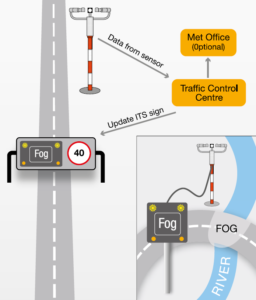A Critical Tool for Safe and Efficient Transportation
The weather can pose significant challenges to maintaining safe and efficient road and rail networks, particularly in regions with varied climates. Accurate and timely weather information is crucial for effective decision-making, especially regarding road maintenance and mitigating the effects of severe weather.
The Importance of Reliable Meteorological Data
Road maintenance and safety, especially during winter months, involve considerable resources. Decisions based on inaccurate or outdated weather data can waste time, manpower, and materials. Moreover, the safety of road users relies heavily on accurate roadside warnings and timely actions such as gritting icy roads. The economic impact of weather-related traffic congestion and accidents further underscores the need for effective weather management.
The Role of Meteorological Sensors
To obtain the necessary weather information in a timely and actionable format, strategically located sensors are essential. These sensors gather data on various parameters, including:
- Visibility: Sensors like the ones offered by Biral measure meteorological optical range (MOR) and can identify the causes of reduced visibility (fog, rain, snow, etc.). This information is vital for activating warning signs, adjusting speed limits, and guiding maintenance efforts.
- Present Weather: Present weather sensors detect precipitation types (rain, snow, freezing rain, etc.), enabling more informed decisions about road treatments and maintenance activities.
- Temperature and Humidity: These measurements help determine dew point, crucial for predicting frost and icy conditions.
- Wind Speed and Direction: Monitoring wind speed and direction can help anticipate hazardous conditions like strong crosswinds or blowing snow, influencing traffic management decisions.
- Precipitation: Accurate rainfall or snowfall data can inform drainage management and trigger responses to prevent flooding or hydroplaning.
- Radiation sensors: Measure solar radiation, helping to predict road surface warming after cold weather events.
- Compact weather stations: Combine multiple sensors in a space-saving solution, offering a comprehensive overview of weather conditions.
The Biral Solution: Customized Sensor Systems
Biral offers a comprehensive range of meteorological sensors designed for the transportation sector. These sensors can be tailored to specific requirements, providing data to weather forecast providers and directly to transportation management systems. The ability to integrate with both local signage and wider networks ensures that accurate information reaches both road users and decision-makers. Biral also distributes a range of meteorological instruments from Adolf Thies GmbH & Co. KG.

Enhancing Safety and Efficiency
By providing reliable, real-time weather information, Biral’s sensors contribute to safer and more efficient transportation networks. Timely decisions about road treatments, warnings, and traffic management can be made, optimizing the use of resources and minimizing disruptions.
Conclusion
Meteorological sensors play a crucial role in ensuring the safety and efficiency of road and rail networks. By investing in accurate and comprehensive weather monitoring systems, transportation authorities can make informed decisions, protect infrastructure, and most importantly, keep travellers safe on their journeys.